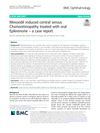Search
for
Sort by
Research
90-117 / 117 results
research Minoxidil to Treat Androgenetic Alopecia in Men and Women: What Is It and How Does It Work?
Minoxidil, originally a blood pressure medication, is effective in treating hair loss in men and women, with different strengths recommended for each.
research Myristoleic Acid Promotes Anagen Signaling by Autophagy Through Activating Wnt/β-Catenin and ERK Pathways in Dermal Papilla Cells
Myristoleic acid helps hair growth by boosting cell growth and recycling processes in hair follicle cells.

research The Chemical and Pharmacological Research Progress on Fructus Malvae
Fructus Malvae may help with diabetes, tumors, and hair loss due to its various active compounds.
research Mineral Deficiencies: A Root Cause for Reduced Longevity in Mammals
Not getting enough minerals can lead to health problems and shorter lifespans.

research The Additive Effects of Minoxidil and Retinol on Human Hair Growth In Vitro
Minoxidil and retinol together help hair grow.

research Synthetic Studies Toward the Development of Novel Minoxidil Analogs and Conjugates with Polyamines
New minoxidil compounds with better water solubility were made, but their full effects and safety need more research.

research Uncovering Shortcomings in Advertising Strategies for Over-The-Counter Minoxidil Products on Amazon
Most minoxidil products on Amazon don't provide safety or side effect information.

research Historical and Current Adenosine Receptor Agonists in Preclinical and Clinical Development
The document concludes that adenosine receptor agonists have potential for treating various conditions, but only a few are approved due to challenges like side effects and the need for selective activation.

research Experimental and Early Investigational Drugs for Androgenetic Alopecia
New hair loss treatments may include topical medications, injections, and improved transplant methods.

research Androgens and Hair: A Biological Paradox with Clinical Consequences
Androgens can both increase body hair and cause scalp hair loss.

research An Uncontrolled Case Series Using a Botanically Derived, β-Cyclodextrin Inclusion Complex in Two Androgenetic Alopecia-Affected Male Subjects
Herbal formula shows promise for hair loss treatment.

research COX2-ATP Synthase Regulates Spine Follicle Size in Hedgehogs
COX2 and ATP synthase control the size of hedgehog spines.

research Vanillic Acid Stimulates Anagen Signaling via the PI3K/Akt/β-Catenin Pathway in Dermal Papilla Cells
Vanillic acid from wheat bran may promote hair growth by activating certain cell pathways and reversing hormone-related hair loss.

research BCL-2 and Bax Expression in Skin Flaps Treated with Finasteride or Azelaic Acid
Azelaic acid and finasteride can help preserve skin flaps after surgery by increasing BCL-2 protein and decreasing bax protein.

research Effectiveness and Safety of Alcohol-Free Minoxidil in Androgenetic Alopecia Treatment
Alcohol-free minoxidil 5% is effective and safe for treating male pattern hair loss.

research Low-Level Laser Therapy for Treatment of Hair Loss
Low-Level Laser Therapy is effective and safe for hair growth with minimal side effects.

research Plasma Zinc Levels in Males with Androgenetic Alopecia as Possible Predictors of Conservative Therapy Effectiveness
Lower zinc levels may predict less effective hair loss treatment.

research Minoxidil Is a Potential Neuroprotective Drug for Paclitaxel-Induced Peripheral Neuropathy
Minoxidil may protect nerves and improve hair quality during paclitaxel treatment.

research Innovative Use of Spironolactone as an Antiandrogen in the Treatment of Female Pattern Hair Loss
Spironolactone helps regrow hair in women with hair loss.

research An Analysis of Gene Expression Data Involving Examination of Signaling Pathways Activation Reveals New Insights into the Mechanism of Action of Minoxidil Topical Foam in Men with Androgenetic Alopecia
Minoxidil foam helps hair growth by increasing good proteins and decreasing bad pathways in men with hair loss.

research Minoxidil Induced Central Serous Chorioretinopathy Treated with Oral Eplerenone – A Case Report
Minoxidil can cause a rare eye condition, but it was successfully treated with oral Eplerenone in one case.

research Relative Uptake of Minoxidil Into Appendages and Stratum Corneum and Permeation Through Human Skin In Vitro
Minoxidil promotes hair growth by penetrating skin, with ethanol-containing formulas working best.

research Quantitative Determination of Nutraceuticals in Matured Unripe Fruits of Three Edible Musa Species Using GC-MS
Unripe fruits of three banana species have many health-boosting compounds useful for medicine.
research Cow Placenta Extract Promotes Murine Hair Growth Through Enhancing the Insulin-Like Growth Factor-1
Cow placenta extract may help hair grow by increasing a growth factor but is less effective than minoxidil.

research Retinal Artery Occlusion as a Probable Idiosyncratic Reaction to Topical Minoxidil: A Case Report
Using minoxidil for hair loss might cause sudden vision loss, so use it with caution and monitor closely.

research A Young Male with Hemorrhagic Cerebral Infarction Associated with Finasteride and Minoxidil
Man had stroke possibly linked to hair loss medications finasteride and minoxidil.